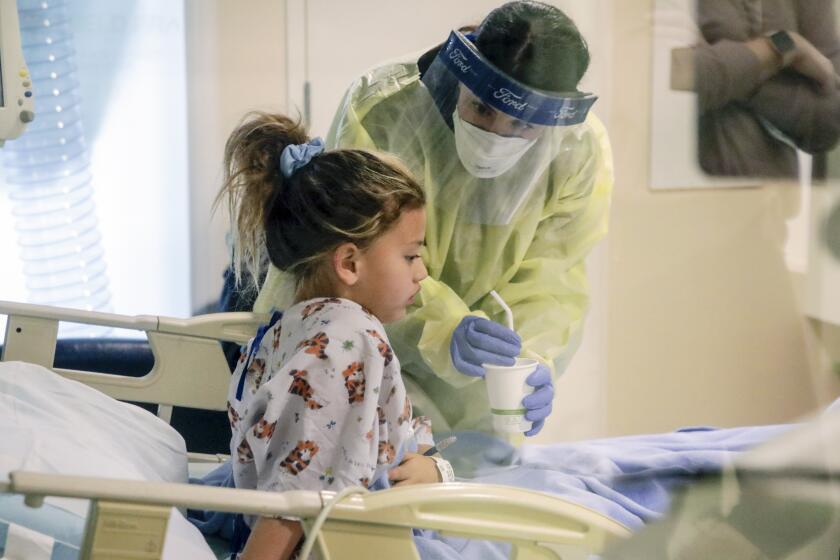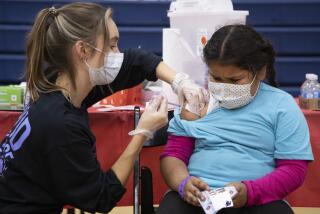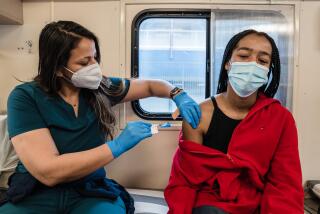All California schoolchildren must be vaccinated against COVID-19 under new bill

State Sen. Richard Pan (D-Sacramento) announces legislation to add COVID-19 vaccines to California’s list of required inoculations for attending K-12 schools.
SACRAMENTO — California students would be required to be immunized for COVID-19 under a bill introduced Monday, offering backup to districts such as L.A. Unified that have struggled with their own mandates while igniting familiar backlash from anti-vaccine activists and parents who say the state should not make medical decisions for their children.
Senate Bill 871, by state Sen. Richard Pan (D-Sacramento), would add COVID-19 vaccines to California’s list of required inoculations for attending K-12 schools, which can be skipped only if a student receives a rare medical exemption. If passed by the Legislature and signed by the governor, the measure would supplant a more limited COVID-19 vaccine mandate for schools that was created by Gov. Gavin Newsom last year.
Under the bill, the California Department of Public Health could mandate vaccines in the future without requiring the state to offer personal belief exemptions, a move that would make it easier to add COVID-19 boosters or other immunizations for students without a lengthy legislative process.
“We need to make sure schools are safe so that all parents are comfortable sending their children to school,” said Pan, a pediatrician whose legislation has strengthened oversight of vaccine exemptions in previous years. “And we want to keep schools open.”
Pan’s bill is the second major vaccine proposal announced this year by Democratic lawmakers who formed a work group last week to focus on measures to increase vaccination rates and reduce misinformation. On Thursday, Sen. Scott Wiener (D-San Francisco) introduced Senate Bill 866, which would permit children 12 and older to choose to be vaccinated, including against COVID-19, without a parent’s consent or knowledge.
Both bills are expected to be met with strong opposition from groups that object to vaccine mandates and those who argue that parents should decide whether to inoculate their children without government intervention. Legislative attempts to change vaccine laws in schools have previously led to intense deliberations, prolonged protests and arrests.
“Given the fact that countries around the world are dropping restrictions, eschewing mandates, and accepting that COVID is becoming endemic, Sen. Pan’s new bill shows just how out of touch he is, both scientifically and politically,” said Stefanie Fetzer, founder of Parents United 4 Kids, which advocates for parental choice. “California parents don’t want the state making parenting decisions for them.”
Health officials say the rising numbers among children are the result of the rapid spread of the Omicron variant, which is much more easily transmitted than earlier strains of the coronavirus.
California already has plans to require students at all public and private schools to receive the COVID-19 vaccine. However, that mandate, which was announced by Newsom in October, does not take effect until after the U.S. Food and Drug Administration fully approves the shot for children ages 12 and older. Currently, the Pfizer-BioNTech vaccine is fully approved for ages 16 and older, and there is only an emergency authorization in place for ages 5 to 15, which is a lesser standard than full approval.
Newsom’s mandate is limited to grades seven through 12 and has a key caveat: Once the vaccine is fully approved, parents could still cite personal beliefs to opt their children out of being inoculated. The state must offer broader personal belief exemptions for any newly required vaccine unless it is added through a new law to the list of shots students must receive to attend school in California. State law requires a medical exemption to skip some or all of those vaccines for in-person attendance at K-12 schools.
Pan’s bill would go much further than Newsom’s mandate, starting with requiring all students from kindergarten through 12th grade to be vaccinated against COVID-19 beginning Jan. 1. That requirement would be in place even if Pfizer-BioNTech remains available through emergency authorization for ages 5 to 15, although Pan said that language is “something we’re still working out.”
By adding COVID-19 shots to the state’s list of required vaccines for students, parents would need a medical exemption in order to skip those doses. Pan said issues surrounding COVID-19 vaccine boosters are not currently addressed in his bill.
“That’s one of the things we’ll have to work out,” he said.
Newsom suggested in October that he may be open to legislative action to strengthen his mandate, but on Monday his office declined to comment on SB 871.
“Governor Newsom has been a national leader in the fight against COVID-19 and keeping our schools safe and open — including announcing first-in-the-nation vaccination and testing requirements for students and school staff,” his office said in a statement. “These actions have led to more California schools remaining open than the rest of the nation. The administration is committed to continuing these efforts with state and local partners.”
Republican lawmakers called Pan’s proposal government overreach, and groups opposed to COVID-19-related mandates vowed to fight both newly introduced vaccine bills.
“Democrats were saying last week that they want to give your children a choice,” said Assemblyman James Gallagher (R-Yuba City). “It’s pretty clear they don’t want to give your children a choice. If they decide not to have a vaccine under this bill, they will be kicked out of school. This is about them wanting you to make the choice that the government has decided for you.”
The San Diego County-based group Let Them Breathe/Let Them Choose, which is against mask mandates for students, also opposes both bills.
“Parents need to speak up for choice and legislators need to actually represent the will of the people,” group founder Sharon McKeeman said.
Pan, speaking in Los Angeles on Monday, countered that vaccine mandates have overwhelming parental support and that some parents are keeping students out of school fearing virus transmission. They would welcome a mandate, he said.
Vaccination rates remain low among younger children in the state, with less than a quarter of 5- to 11-year-olds fully vaccinated, according to data from the California Department of Public Health. Nearly 64% of children 12 to 17 are fully vaccinated in California, while overall 73% of residents in the state eligible for a COVID-19 shot have received both doses.
On Friday, interim school district Supts. Megan Reilly of Los Angeles Unified and Lamont Jackson of San Diego Unified implored legislative leaders in a letter to take “urgent action to enact a statewide vaccine mandate for public school students.”
Last month, a San Diego County judge struck down a COVID-19 vaccine mandate for San Diego Unified students, ruling that the district lacked authority to implement it. The school system, the state’s second largest, is appealing. The district has so far prevailed in a separate federal lawsuit, but that case remains active as well.
San Diego Unified’s student mandate was to have taken effect Monday — the start of the spring term in that school system. The mandate would have applied to students 16 and older. Just more than 77% of students 16 and older have been fully vaccinated, said school board member Richard Barrera.
He added that the district would move forward immediately with its mandate — ahead of the state — if it prevailed in court.
Officials at L.A. Unified have postponed enforcement of their student vaccine mandate until the fall, citing the disruption of having to transfer more than 20,000 unvaccinated students off campus and into independent study in the middle of the school year. Such a move also would have disrupted the education of fully vaccinated students and resulted in having to transfer teachers to the independent study program, Reilly said.
L.A. Unified also faces litigation over its vaccine mandate, but there’s been no ruling in the case. Reilly insisted that the threat of litigation would not compel the nation’s second-largest school system to change course.
The district’s mandate applies to students 12 and older. Close to 90% have been inoculated or received a medical exemption, but that still leaves about 20,000 students out of compliance.
Pan formally unveiled his proposal Monday at Arleta High School in Los Angeles, where a student, Erika, who declined to give her last name, joined officials at a news conference to speak in support. In the fall, when L.A. Unified announced its mandate, the first deadline applied to athletes because of the close contact involved in sports.
“In order to play basketball, I had to be vaccinated,” Erika said. Otherwise, she added, she would not have been ready at that time to be inoculated. Now that she’s taken the shots, she said, she feels more protected.
“Mandates work and they save lives,” Reilly said.
At L.A. Unified, infections remain near record levels, although rates have decreased and attendance improved during the second week following the return of students from winter break.
“The evidence clearly shows that vaccines help reduce the spread of infection, which will reduce transmission in schools and protect those who are medically vulnerable,” the San Diego and L.A. superintendents wrote in their letter to legislative leaders. “The vaccine will also help reduce COVID-related absences, and reduce the likelihood that schools will need to be closed for outbreaks.”
More to Read
Sign up for Essential California
The most important California stories and recommendations in your inbox every morning.
You may occasionally receive promotional content from the Los Angeles Times.












